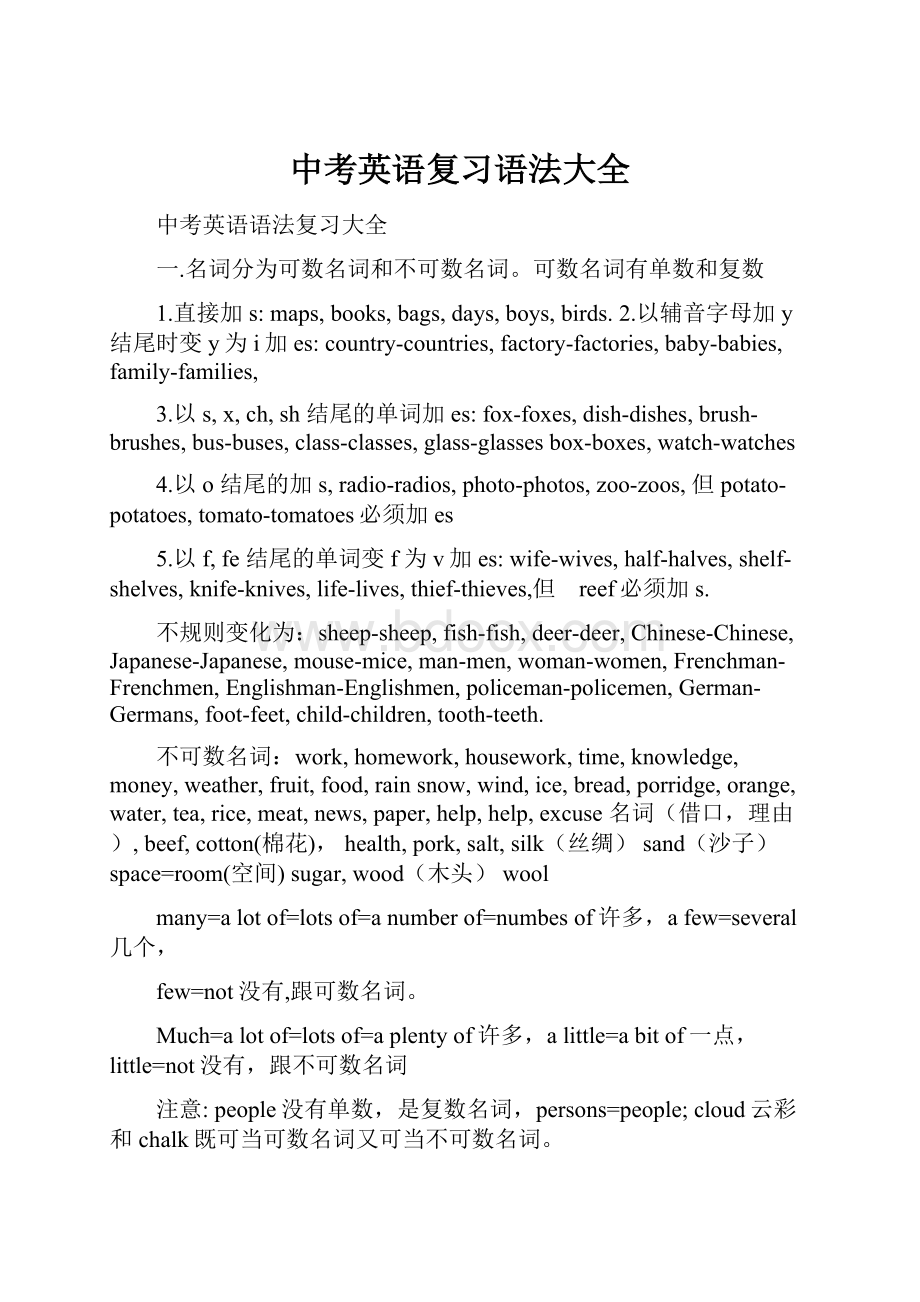中考英语复习语法大全.docx
《中考英语复习语法大全.docx》由会员分享,可在线阅读,更多相关《中考英语复习语法大全.docx(71页珍藏版)》请在冰豆网上搜索。

中考英语复习语法大全
中考英语语法复习大全
一.名词分为可数名词和不可数名词。
可数名词有单数和复数
1.直接加s:
maps,books,bags,days,boys,birds.2.以辅音字母加y结尾时变y为i加es:
country-countries,factory-factories,baby-babies,family-families,
3.以s,x,ch,sh结尾的单词加es:
fox-foxes,dish-dishes,brush-brushes,bus-buses,class-classes,glass-glassesbox-boxes,watch-watches
4.以o结尾的加s,radio-radios,photo-photos,zoo-zoos,但potato-potatoes,tomato-tomatoes必须加es
5.以f,fe结尾的单词变f为v加es:
wife-wives,half-halves,shelf-shelves,knife-knives,life-lives,thief-thieves,但 reef必须加s.
不规则变化为:
sheep-sheep,fish-fish,deer-deer,Chinese-Chinese,Japanese-Japanese,mouse-mice,man-men,woman-women,Frenchman-Frenchmen,Englishman-Englishmen,policeman-policemen,German-Germans,foot-feet,child-children,tooth-teeth.
不可数名词:
work,homework,housework,time,knowledge,money,weather,fruit,food,rainsnow,wind,ice,bread,porridge,orange,water,tea,rice,meat,news,paper,help,help,excuse名词(借口,理由),beef,cotton(棉花),health,pork,salt,silk(丝绸)sand(沙子)space=room(空间)sugar,wood(木头)wool
many=alotof=lotsof=anumberof=numbesof许多,afew=several几个,
few=not没有,跟可数名词。
Much=alotof=lotsof=aplentyof许多,alittle=abitof一点,little=not没有,跟不可数名词
注意:
people没有单数,是复数名词,persons=people;cloud云彩和chalk既可当可数名词又可当不可数名词。
二.名词所有格是在名词后面加’s,以s结尾的加’,另外人用’s,物用of
如:
Meimei’sbook,Bob’sbike,thestudentsofclass,apictureofmyfamily,afriendofJim’s
thestudents’desks,Teachers’Day教师节,Women’sDay,Children’sDay,
LucyandLily’sroom路丝和利丽共有的房间,Jim’sandTom’sfathers吉姆和汤姆各自的父亲三..代词的用法:
1.主格:
I,you,he,she,it,we,you,they作主语
2.宾格:
me,you,him,her,it,us,you,them用在动词和介词后作宾语.
3.形容词性物主代词:
myyour,his,her,its,ouryour,their后面必须跟名词
4.名词性物主代词:
mine,yours,his,hers,its,oursyours,theirs,
5.反身代词:
myself,yourself,himself,herself,itself,ourselves,yourselves,themselves,
6.反身代词的搭配:
teachoneself=learnbyoneself(自学)
如:
IteachmyselfEnglish.=IlearnEnglishbymyself.
buyoneselfsth.如:
Heboughthimselfapen.他为自己买了一支钢笔。
enjoyoneself=haveagoodtime
helponeselftosomefood(somedrink)自用食物和饮料,hurtoneself伤到自己,
lookafteroneself,byoneself=alone独自,leavebyoneself=leavealone把某人单独留下,
7.指示代词:
this----these,that----those,this(that)is;these(those)are
8.不定代词:
代表人的有:
everyone(body),someone(body),anyone(body),noone=nobody
代表物的有:
everything,something,anything,nothing
注意:
(1)当单数用。
如:
Iseveryonehere?
Somethingiswrongwithmybike.Everythingbeginstogrow.Isthereanythingcheaper?
(2)另外something,someone用于肯定句,anything,anyone用于否定句和肯定句。
no=notany,nothing=notanything,nobody=notanybody=noone=notanyone
如:
Icanseenothing.=Icannotseeanything.
Thereisnobodyhere.=Thereisnotanybodyhere.
(3)不定代词用形容词修饰时,要把形容词放在后面。
如:
Thereisnothingserious.没有什么严重的。
Thereissomethingwrongwithmyradio.我的收音机没有毛病。
9.all____none用于三者以上,all(都)用复数,none(都没有)用单数和复数都行。
它们代人代物都行。
如:
Alloftheboysareintheroom.=Alltheboysareintherṯom.=Theboysareallintheroom.所有的男孩都在间
AlloftheanimalsarejumpingḮ=Alltheanimalsarejumping.=Theanimalsarealljumping.
Allofthemeatisontheplates.=Allthemeatisontheplates.=Themeatisallontheplates.
Noneoftheseatsare/ismine.Noneofsheepis/areinthefield..Noneofushave/hasanegg.
10.both(都)___neither(二个都不),用于二者,both表示肯定句,neither表示否定句。
如:
TheybothstudyFrench.=BothofthemstudyFrench..肯定句
NeitherofthemstudiesFrench.否定句
Thegirlsarebothathome.=Bothofthegirlsareathome.肯定句
Neitherofthegirlsisathome.否定句
Bothofthepersonsaredoctors.肯定句Neitherofthepersonsisadoctor.否定句
Bothofyoudosportsatschool.肯定句Neitherofyoudoessportsatschool.否定句
Webothhavetostayonthefarm.肯定句
Neitherofushastostayonthefarm.我们二个都不必呆在农场。
Both…and当复数用______neither…nor根据第二个主语决定动词
Bothheandshegettoschoolatsix.______Neitherhenorshegetstoschoolatschool.
BothheandIarestudents.______NeitherhenorIamastudent.
BothLilyandlucyoftenflythekites._____NeitherLilynorLucyoftenfliesthekites.
Either…or…(或者…或者,二者中其中一个),动词也根据第二个主语决定。
如:
EitheryouorAnnhasaglassofwater.或者你或者我喝一杯水。
EitherheorIamaworker.或他或我是一位工人。
11.other(其他的)后跟名词复数,没有地点的限定.如:
Somestudentsaresinging,otherstudentsaredancing.otherstudents=others
theother(后跟复数是其他的),有地点的限定.如:
Somestudentsarewritnginourclass,
theotherstudentsarereading.
theother(后跟单数是两者中另外一个).如:
Therearetwogirls,oneismysister,theothergirlishissister.
another(后跟单数是另外一个),但不规定在两者用.如:
Ihaveanapple,andIwantanotherone.
2.情态动词:
can(could),may(might),must(must),should应该,haveto(hasto),不得不,beableto
都跟动词原形。
如:
Hecandance.=Heisabletodance.肯定句
Canhedance?
=Isheabletodance?
一般疑问句
回答:
Yes,hecan.No,hecan’t.Yes,heis.No,heisn’t.
否定句:
Hecan’tdance.=Heisnotabletodance.(注意:
can=am/is/areabletodosth.)
Icouldreaditeasilylastyear.=Iwasabletoreaditeasilylastyear.肯定句
Couldyoureadeasilylastyear?
=Wereyouabletoreaditeasilylastyear?
疑问句
回答:
Yes,Icould.No,Icouldnot.Yes,Iwas.No,Iwasnot.
否定句:
Icouldn’treaditeasilylastyear.=Iwasnotabletoreaditeasily.(could=was/wereableto)
Shecanenjoyherselfinthepartytomorrow.=Shewillbeabletoenjoyherselfinthepartytomorrow.
Theymaybeathome.=Maybe/Perhapstheyareathome.他们可能在家。
肯定句
Theymaynotbeathome.=Maybe/Perhapstheyaren’tathome.否定句
Maytheybeathome?
Yes,theycan.No,theycan’t(.注意:
may用can回答)
Shemayhaveameeting.=Perhaps/Maybeshehasameeting.
Youmustfinishyourwork.肯定句Youmustn’tfinishyourwork.否定句
MustIfinishmywork?
Yes,youmust.No,youneedn’t.(注意:
must用needn’’t否定回答)
Weshouldspeakloudly.肯定句Weshouldnotspeakloudly.否定句
Shouldwespeakloudly?
疑问句Yes,youshould.No,youshouldnot.
情态动词没有人称和数的变化,以上情态动词变否定句时在其后加not,疑问句往前提。
need在肯定句中做行为动词,在否定句中作行为动词和情态动词都行。
如:
Heneedstodosomeshopping.Doesheneedtodosomeshopping?
Yes,hedoes.No,hedoesn’t.
Hedoesn’tneedtodosomeshopping.=Heneedn’tdosomeshopping.
I(We,You,They)havetowatchgames.I(We,You,They)don’thavetowatchgames.
Doyou(I,we,they)havetowatchgames?
Yes,I/we/theydo.No,I/we/theydon’t.
He/She/Ithastogoforawalk.He/She/Itdoesn’thavetogoforawalk.
Doeshe/she/ithavetogoforawalk?
Yes,he/she/itdoes.No,he/she/itdoesn’t.
I/We/You/You/He/She/It/Theyhadtodohousework.I/We/He/Theydidn’thavetodohousework.
Didyou/he/she/they/ithavetohavetodohousework?
Yes,I/he/theydid.No,I/she/he/theydidn’t.
动词的时态有8种时态:
1.动词的单数第三人称和名词复数一样:
(1)加“s”;looks,finds,jumps,begins,starts,plays
(2)以“s,x,ch,sh,o”结尾的单词结尾加“es”,passes,relaxes,teaches,catches,watches,washes,finishes,rushes,brushes,goes,does,
(3)以辅音字母加“y”结尾时,变“y”为“I”加“es”tidy-tidies,try-tries,fly-flies,carry-carries,
study-studies(4)特殊的有“have-has”
单数第三人称用于一般现在时,它表示习惯/经常/有时有规律的事,它的构成是:
I(We,You,You,They,名词复数)+动词原形;He(She,It名词单数)+动词的单数第三人称。
I(We,You,They)havelunchathome.肯定句)He/She/Ithassupperatschool.
I(We,You,They)don’thavelunchathome.否定句)He/She/Itdoesn’thavesupperatschool.
Doyou(we,they)havelunchathome?
(一般疑问句)Doesshe/Ithavesupperatschool?
.
Yes,Iwe/you/theydo.No,I/we/you/theydon’t.Yes,heshe/itdoes.Nohe/she/itdoesn’t.
Whohaslunchathome?
(特殊疑问句)Whohassupperatschool?
Whatdoyou/theyhavelunch?
(同上)Whatdoeshe/she/ithaveatschool?
Wheredoyou/theyhaveathome?
(同上)Wheredoeshe/she/ithavesupperatschool?
Thepeoplewatchthematchsometimes.Thispersonwatchesthematchsometimes.
Thepeopledon’twatchthematchsometimes.Thispersondoesn’twatchthematchsometimes.
Dothepeoplewatchthematchsometimes?
Doesthispersonwatchthematchsometimes?
Yes,theydo.No,theydon’t.(肯定回答,否定回答)Yes,hedoes.No,hedoesn’t.
注意:
一般现在时通常用always,often,usually,every(day,week,month,year),inthe(morning,afternoon,evening),on(Sundays,SaturdaysTuesdays),sometimes,等时间状语连用。
2.动词的过去时和过去分词一样,规则变化都是加“ed’’。
(1)加“ed”。
例如:
worked,catched,planted,played,needed,
(2)以辅音字母加“Y”结尾的单词变“y”为“I”加“ed”。
carry-carried,study-studied,tidy-tidied,try-tried.
(3)以“e”结尾的加“d”,move-moved,liked,loved.
(4)双写的有:
stop-stopped,shop-shopped,drop-dropped,prefer-preferred,travel-trve(l)led,plan-planned.
动词的过去时用于一般过去时,它表示过去某一时间发生的动作和存在的状态。
常与yesterday,threedaysago,thedaybeforeyesterday,lastweek(month,year),justnow=amomentago,in1990等时间状语连用。
I/We/You/You/He/She/It/Theytidiedthehousejustnow.(肯定句)
I/We/You/You/He/She/It/Theydidn’ttidythehousejustnow(否定句)
Didyou/I/we/he/she/it/they/tidythehousejustnow?
(一般疑问句)
Yes,I/we/he/she/theydid.No,I/wedidn’t.
Whatdidyou/he/she/it/theydo?
Whatdidyou/he/she/theytidy?
Whendidyou/he/she/theytidythehouse?
3.动词的过去分词用在现在完成时和过去完成时中。
(1)它表示过去发生的动作对现在的影响和结果。
常与already(已经),yet(还),just(刚刚),ever(曾经),never(从来没有过),before(以前)sofar(至今为止),inone’slife(终生)连用。
already用于肯定句和一般疑问句中,即可放在have/has与过去分词之间,又可放在句末。
Yet用于疑问句和否定句句末。
Before,sofar,inone’slife放在句末。
(justevernever)放在have/has和过去分词的中间。
inthepast2years在过去的二年
如:
Ihavealreadyfinishedmyhomework.Ihaven’tfinishedmyhomeworkyet.
Haveyoufinishedyourhomeworkyet?
Yes,Ihave.No,Ihaven’t.
Hehaseverbrokenwindowsbefore.Hehasneverbrokenwindowsbefore.
Hasheeverbrokenwindowsbefore?
Yes,hehas.No,hehasn’t.
Theyhavejustlefthomeforschool.Howmanysongshasshelearnedsofar?
Ihaveneverseensuchabeautifulmountainsinmylife.
(2)现在完成时还表示过去已经开始,持续到现在的动作或状态,延续到现在,与forthreedays(三天时间),sincelastyear(自从去年),eversince1996(自从1996年),同时动词要用延续动词。
Leave-beaway,comeback-beback,comehere-behere,goout-beout,gothere-betherebegin(start)